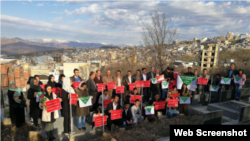Iranians have demonstrated at the location of a decades-old chemical attack to condemn a suspected gas attack on a Syrian town last week that killed dozens of civilians, and to call for an end to the use of such weapons.
The gathering, in the Iranian city of Sardasht on April 6, reportedly included surviving family members of some of the 100 or so people who died when former Iraqi leader Saddam Hussein's forces used mustard gas in 1987 as the eight-year Iran-Iraq war dragged on.
Three decades later, many people in Sardasht and in Halabcha -- the site months later of what is believed to be the deadliest chemical attack ever on a civilian population -- are still suffering from exposure to weaponized gas.
The Sardasht demonstrators gathered at a cemetery where many of those killed in the attack on that city are buried to commemorate the dead and injured of the attack in Khan Sheikhun, in Syria.
Reports on local news sites said victims, their relatives, Sardasht residents, and activists attended the Iranian event.
Pictures from the event show men, women, and children holding signs that read, "Sardasht, Halabcha, Khan Sheikhun: Condolences Again," and, "Together Against Unconventional And Banned Weapons."
The Society for the Defense of the Rights of Chemical Weapons Casualties in Sardasht, which had organized the event, said in a statement that by targeting Khan Sheikhun with chemical gas, "another criminal" had renewed the decades-old pain of Sardahst's people.
The United States and other Western countries have blamed Tehran’s ally, Syrian President Bashar al-Assad, for the attack, which left more than 80 dead, and U.S. forces launched dozens of cruise missiles at a Syrian air base on April 7 in response.
Iran has suggested that "terrorists," a term it frequently uses to refer to all groups in Syria opposed to Assad, could be behind the attack.
Iran's president, Hassan Rohani, has called for an international probe into the incident.
The Society for the Defense of the Rights of Chemical Weapons Casualties in Sardasht did not seek to assign blame for the attack. It just expressed hope that people in that city would be among the world's last victims of chemical weapons.
But it added, "We’re seeing children, women, and men becoming victims of chemical bombing in Khan Sheikhun, while there is no peace in this war-torn region."
“We people of Sardasht want peace,” the statement said.








